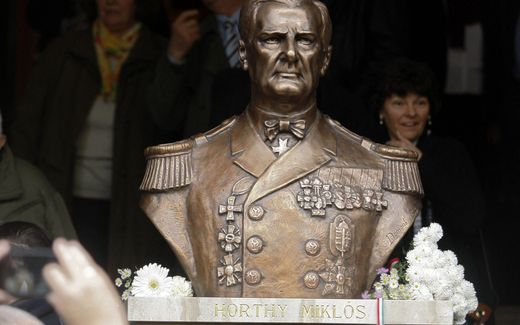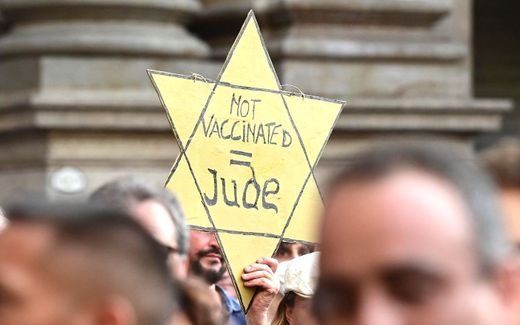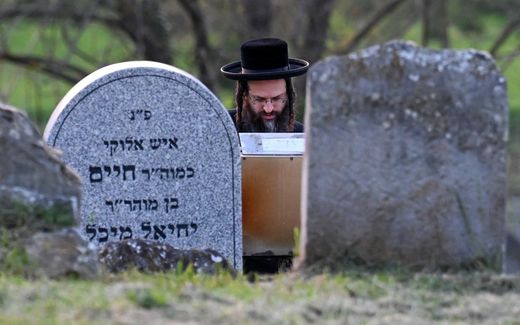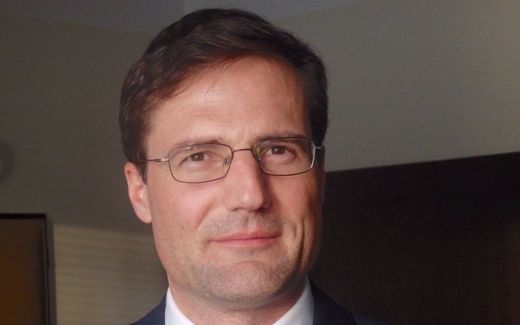Jews in Hungary live on “a safe island”, says rabbi Radnóti
04-11-2023
Central Europe
Kees van den Brink, RD
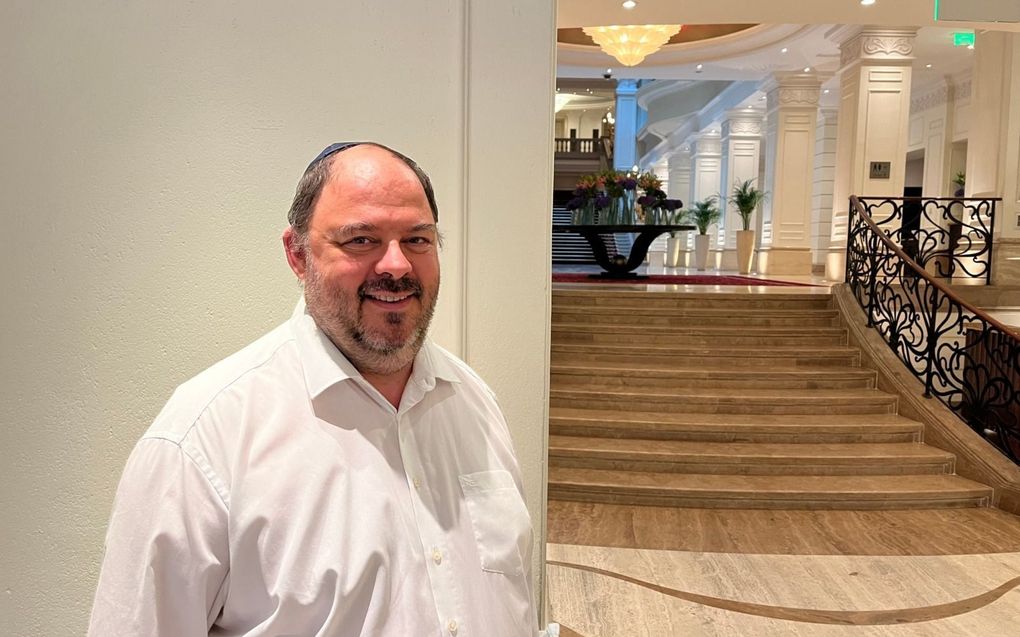
Zoltán Radnóti, the chief rabbi of Budapest. Photo RD
Central Europe
Jews are generally safe in Hungary, argues Zoltán Radnóti (51), head of rabbis in Budapest. Anti-Semitism is not a significant problem in his country, he believes. "Thanks to President Orbán, Budapest is an island without Muslim fundamentalists in Europe. Pro-Palestinian demonstrations are banned."
With his peasant cap, overhanging shirt and cheerful appearance, Radnóti does not quite fit the stereotype of an Orthodox rabbi, but neither is he. The "neolog" movement to which he belongs arose in the 19th century, aiming to unify Judaism with the Hungarian way of life and holds the middle ground between orthodox and liberal. For the photo, though, the rabbi gladly exchanges his cap for a kippah.
Exactly how many Hungarian Jews there are, "nobody knows," says the rabbi of Beth Shalom (House of Peace) synagogue in the western Buda-part of the Hungarian capital. After World War II, there were many mixed marriages between Jews and non-Jews; it depends on your definition of who is Jewish then. In a population survey in 2022, 7635 Hungarians said they were religiously Jewish. That is a fraction of the 50,000 to 100,000 that estimates usually assume. "Because of the Holocaust, Jews dislike being listed. So they don't sign up," Radnóti explains.
The rabbi himself estimates that there are some 85,000 Jews in Hungary. He bases this on their tax returns. In doing so, Hungarians have the option of choosing a religious denomination to which the government transfers 1 per cent of their income tax. About 0.85 per cent of taxpayers then choose a Jewish institution. As Hungary has a population of 10 million, there are probably some 85,000 Jews, Radnóti calculates. Of these, three-quarters belong to the neolog movement and 15 per cent to ultra-Orthodox Hasidism. The rest are Orthodox, liberal (Reform Judaism) or progressive.
Safe
The optimism the rabbi exudes does not change when it comes to the situation of Hungarian Jews. They are practically unaffected by anti-Semitism. A Jew wearing a kippah is not yelled at on the street. "We are generally safe here," says Radnóti. A fellow Hungarian Rabbi from Budapest, Róbert Frölich, recently revealed the same to the Central European news website Remix.
This positive sound stands out, not only compared to other European countries but also because Hungarians are not Jewish by nature. This is clear from a Hungarian saying quoted by Radnóti: "The Hungarian anti-Semite is he who hates the Jews more than is necessary." In other words, Hungarians dislike Jews, but it only becomes a problem when it is more than average.
"Hungarians love themselves above all," Radnóti explains. "In their hearts is a struggle. They don't know who their greatest enemies are: Jews or Muslim immigrants." Even President Viktor Orbán is not necessarily pro-Jewish, as evidenced by the connections he has with Turkish President Erdogán. Radnóti: "It is difficult for him: does he choose for Israeli Prime Minister Netanyahu or Erdogán?"
Father
Still, according to Radnóti, the safe situation for Hungarian Jews is thanks to Orbán. "Because he keeps the borders closed, there are hardly any pro-Palestinian people in Budapest. There is no threat of attacks. Hungarians see that there is peace here. Orbán is seen as the father of the people. It is better here than in, say, Berlin, Paris, Brussels and Stockholm, where it is less safe for Jews. Budapest is an island in Europe, without Muslim fundamentalists."
Incidentally, that does not mean the rabbi supports Orbán and his nationalist policies. "With Orbán's motives, I disagree. He is populist, far-right, not humane. But Jews now benefit from his immigration policy with closed borders."
So what about Jobbik, a Hungarian political party that was quite large until a few years ago and also outspokenly anti-Semitic? "Jobbik, yes. Jobbik is Jobbik. It is a minority, and the party is not good. But Orbán has drawn Jobbik's supporters to himself. The party has become very weak."
Universities
Consequently, since war broke out in Israel in October, there has been hardly any anti-Israel sentiment. Pro-Palestinian demonstrations are strictly forbidden, the rabbi said. "Hamas is terrorist, period; such was Orbán's attitude. You don't see any pro-Palestinian expressions at universities here either."
In various ways, the Jewish community in the Hungarian capital expressed support for Israel in recent weeks. For instance, shortly after the "tragedy in Israel", a "big memorial ceremony" took place in the main synagogue on Dohány Street, the largest synagogue in Europe. "There were more than a thousand people present," Radnóti says. "All political parties from the parliament -from the left to the right- were represented. The rabbi who gave a speech said, "Why do we need to see Jewish blood before the left and right sit together for the same cause?"

Police permission
Numerous Israelis of Hungarian origin have returned to Hungary in recent weeks. Radnóti: "We took care of them. There is a special class for children from Israel, and parents were given offices and laptops to work." The Jewish community also started a fundraiser for the hard-hit Israeli kibbutz Be'eri near the Gaza Strip. And last Thursday, a "red-balloon demonstration" took place in Budapest with police permission for the Israelis held hostage in Gaza.
About going back to Israel, the rabbi never frets. Laughingly, he quotes a Jewish proverb: "The true Zionist is he who helps someone to Israel with the money of a third party." Every year, over a hundred Hungarian Jews make "aliyah" –emigrate to Israel– and Radnóti is happy to help. "But I have my mission here, to help people," he says.
Identity
"As a rabbi, I want to give Hungarian Jewry new goals and new self-awareness," Radnóti writes on his website. Why? "Our generation is doubly saved. My mother was born in 1945. She was saved from the Holocaust by my grandmother. So I, born in 1971, am a 'double saved' child."
However, under communism, after World War II, most Jews put away their identity, although they were not oppressed, says the rabbi. "Jews forgot their origins and education. The Jews who still knew about the Holocaust are now deceased. I want to show Hungarian Jews: if you have Jewish roots in your mind, take them out and show them. Be proud of them. Why publicly show them? That's why I talk about being Jewish on my blog and on YouTube and to your newspaper."
This article was translated by CNE.news and published by the Dutch daily Reformatorisch Dagblad on November 2, 2023
Related Articles



